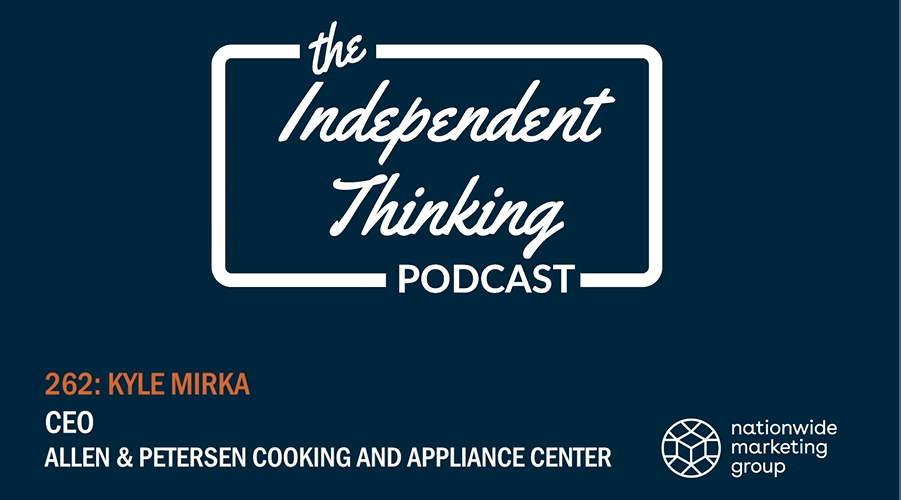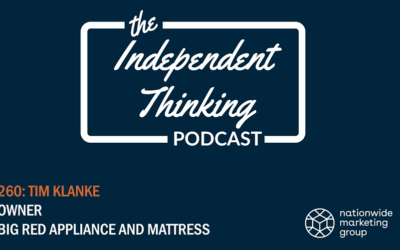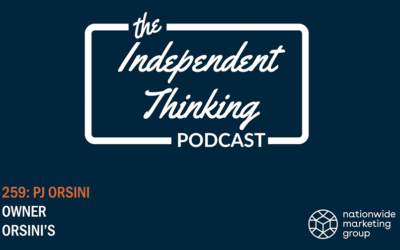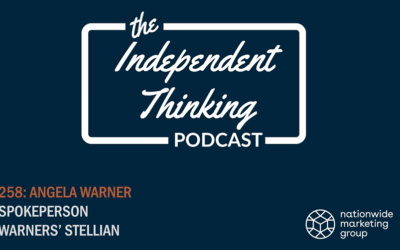This episode of the Independent Thinking Podcast was recorded at the Nationwide Marketing Group (NMG) PrimeTime event and expo in Nashville (August 2025).
On this episode, NMG’s Director of Marketing Communications, Julie Manson, interviews Kyle Mirka of Allen & Petersen Cooking & Appliance Center in Anchorage, Alaska. Highlights of the conversation include:
- Making data-driven business decisions
- Tapping into the power of NMG’s PriMetrix data
- Allen & Petersen’s unique leadership model
- Mentoring employees
- Building relationships with industry peers
- Establishing true partnerships with vendors
WATCH this episode on YouTube.
Read the full transcript below.
Julie Manson (JM): Hi, we’re here at PrimeTime with Kyle. Kyle, we’re so excited to have you here and thank you so much for spending a little bit of time with us. Maybe if you could just introduce yourself and it sounds like you’ve been coming to PrimeTime for quite some time.
Kyle Mirka (KM): Yes.
JM: So yeah, just tell us a little bit about yourself.
KM: Well, we run a business in Anchorage, Alaska. I have been coming to PrimeTime since 2010 and I have not missed a single PrimeTime. My wife doesn’t always love that. I think I was here maybe three days after our middle child was born, so I’m dedicated.
JM: Commitment.
KM: But we love it here.
JM: That’s awesome. And so what keeps you coming back year after year?
KM: I think the most important part of PrimeTime for me is the relationships that I build. Those relationships have carried on for many, many years and they are deep and they’re rewarding. Not only do we learn from each other in business kinds of concepts, but we know each other well personally as well. So those relationships are very special to me and that definitely keeps me coming back year after year.
JM: Now, did you grow up in the business?
KM: I started in the business at 17 years old. I had previously worked at Sears in electronics. I sold a man a vacuum and he was associated with the business that I now own, and he recommended to my former boss to interview me. And so we had an interview and then I started work selling appliances.
JM: So just 17 years old. Oh, that’s a really neat story. So what do you love best about it?
KM: You know, relationships to me are very important and I think that relationship with customers, relationships with employees, those probably mean the most to me. That’s the most rewarding factor, I think, in what we do.
And then I’m kind of a nerd, I have an accounting degree and so I love numbers and I love business concepts and being able to implement those kinds of things within our business is very fun for me.
JM: That’s good. So do you use a lot of data to make decisions and you know, kind of how are you able to integrate that into the way that you’re running your day to day?
KM: Yeah. I’m a guy that loves the numbers and loves to deep dive into all of those factors. And so data and analytics are something that I kind of cherish. And within Nationwide, PriMetrix really helps feed a lot of that and helps me with information and sometimes information that I wouldn’t have without Nationwide. And so I’m grateful for that.
JM: Good. And then so a lot of that we were talking earlier about, just how during our main stage presentation, we talked about how even when times are uncertain, you know, there’s always going to be things that are unpredictable or maybe might feel a little uncomfortable, but those are the times where we kind of lean in and try something different. Was there a time in your career that you were kind of in choppy waters and made the move anyway?
KM: You know, there have been a couple of times. Of course, the housing crisis was a huge one. To be able to experience that firsthand is not a cherished memory, but certainly a valuable one.
JM: Growing one.
JM: Yeah, for sure. And then, you know, pre-pandemic, even a few months before in 2020, my business partner and I really took a deep look at our business to evaluate the future and make sure that we could continue another, you know, 50 plus years. And so we implemented a lot of changes to make sure our business was healthier and stronger. And that was a very powerful time for us. And it has revolutionized our business to be able to propel into the next 50 and 100 years.
JM: Was there anything that you took away from that, you know, transformational plan that you would share with another member who might be looking at how to reinvent?
KM: Absolutely.
JM: Reinvent or…
KM: Absolutely. We kind of preach it at as many meetings as we possibly can, but we implemented a book called Profit First. Profit First was written by Mike Michalowicz.
JM: Okay.
KM: And it’s a very basic cash management type solution that any person can implement. They don’t have to be a CPA.
JM: Yeah.
KM: They don’t actually have to be that smart… in our case, especially. So that had revolutionized our business. It was something that was so powerful and changed us so dramatically that we kind of shout it from the rooftops.
JM: That’s amazing. We’ll put that in the show notes for sure then.
So, and is that something that you, when new associates come in to be part of the organization, are you training them on that, or is it kind of integrated into the culture of the company?
KM: Yeah. Profit First is more cash and profitability management. So that’s something that my business partner and I usually kind of head up and it doesn’t have to filter all the way through you to employees to be able to manage it.
JM: But it’s made your business healthier.
KM: It sure has.
JM: Yeah. So, and you’ve talked a lot about your partner. It sounds like you have a team leadership model.
KM: Yep.
JM: So how long have you been working together as a team?
KM: So I became a partner in the business in 2013.
JM: Okay.
KM: It was right after I had graduated from college with a degree. And my former business partner who had moved in 2018, but he had invited me to become a partner. And so we kind of do it as a team. Even when he left, Kenny, my other business partner, remained. And so he and I run the business today, and then we welcomed another partner that we have other business relationships with here a couple of years ago as well. So definitely a team approach and we all kind of take our piece of the pie and run with it.
JM: Okay. I was going to ask you, is it a divide and conquer method and then how, for other members who are in that type of leadership model where there’s shared responsibilities and… cause that it’s hard, whether it’s a household or a business, it’s hard to kind of navigate those waters. So any best practices that you’ve learned, you know, about working together in that capacity?
KM: Yeah, we, I have several friends here on the show floor that, that have family dynamics within their businesses and maybe some internal fights between brothers or whatever the case may be, but I, a practice that we have always had in place was we vote each year at the beginning of each year, who’s going to lead the business. And then after that vote is made, we put forth all confidence in that individual to lead and guide the company, at least for that year. So that’s been my privilege and responsibility since 2019.
JM: Kind of renew those vows annually to make sure. And then I’m sure, especially with family dynamics change that gives us all the flexibility to be able to do that. That’s really neat. So the rotational based leadership, but it’s not a forced rotation. It’s who’s in the best position to, yeah.
KM: Yeah. And Kenny is a wonderful partner to be able to say and support me as I go about and run the business. So yeah, it works really well.
JM: So, we talk a lot about, especially in some of those family-run, but even, you know, even if you’re working for a big company, if you’re owning your own business, you would also want to leave something better than how you found it. So, you know, what is the legacy that you hope to leave as you grow with the company?
KM: I think ultimately that legacy I would love to leave is a larger organization, something that can reach more customers and take care of more employees. But I think to get there, those employees are so critical and I was asked very early on in my professional career, what impact I wanted to leave and what was most important to me. And employees really were what got me up in the morning. I wanted to make sure that we could take care of them and that their lives were blessed both professionally and personally by their interactions with us. And so that’s what drives me. And then I hope that my legacy is a much broader business than what I came into.
JM: How would you describe your leadership style, then? And are there any inspiration that you’ve had in terms of growing and developing others that you’ve been able to apply?
KM: Yeah, that phrase right there is probably the most key. To develop others is probably my strongest suit when it comes to being able to interact with those employees. I am not a micromanager. I am a, as opposite as that could possibly be from a micromanager.
And in fact, I don’t even mind letting an employee make a mistake that costs me money because hopefully that employee is going to be around for a long time and be able to make a better decision in the future. Of course, I’ll step in at some point.
JM: Of course.
KM: Yeah. I, it’s not quite a hands-off approach because that wouldn’t be the right word, but it’s definitely a learn in the position that you have.
JM: Did you have a mentor that inspired your style of leadership, whether formal or informal?
KM: Yeah. Yeah. I definitely had lots of mentors growing up. My former business partner, Leon Barbacano, was a great mentor to me and taught me a lot. I wouldn’t say our styles are necessarily the same, but on the big picture, on the grand, grand stage, we saw eye to eye and so for sure. But I think my, I won’t say my style is unique, but I don’t know that was taught. I think that was just something that was inside.
JM: Organic and crafted a little in a way.
KM: Yes. For sure. For sure.
JM: So, what are any thing that you’re really excited about seeing on the showroom floor today?
KM: Oh, I think that, again, going back to those relationships, those are the most important to me. And so I like to, to grab so-and-so and grab so-and-so as we pass each other in the aisle to be able to make a connection or to be able to help them with a thought that I’ve had, maybe thinking about them specifically.
But I’ll also say that the relationships with manufacturers are, those vendor partners that, that word partner should mean something. Those vendors, if they’re not your partner, they’re probably not really pulling their weight in that relationship. And so I love those partnerships and to be able to see individuals that I’ve got to work with for, you know, literally decades is a fun time. And so it’s a very rewarding experience.
JM: And I guess in terms of, you know, you’ve talked a lot about relationships. What are some of the best practices that you’ve used in order to be able to not just maintain those relationships, but grow, nurture? Are there practices that you put into play or, you know, frequency, cadence, that type of thing? Or is it, it just kind of happens and happy accident?
KM: I like to remind sales reps that people do business with people. I can buy a washing machine from just about anybody, but those relationships that I have with a sales rep, the way that they support me and my business and my team make a difference. And so I think that that’s kind of an inherent thought that most of us have. But it’s important to really make sure that we give that words and give that thought and remember that that is important.
JM: Yeah. Yeah. Great. Was there any questions that I didn’t ask that you wish I would’ve?
KM: I don’t think so. That was pretty well-rounded. Nice job.
JM: Nice job to you. Thank you so much for being here. We really appreciate you taking the time and we hope you have a wonderful rest of PrimeTime. Take care.
KM: Thanks so much.
JM: Thank you.




